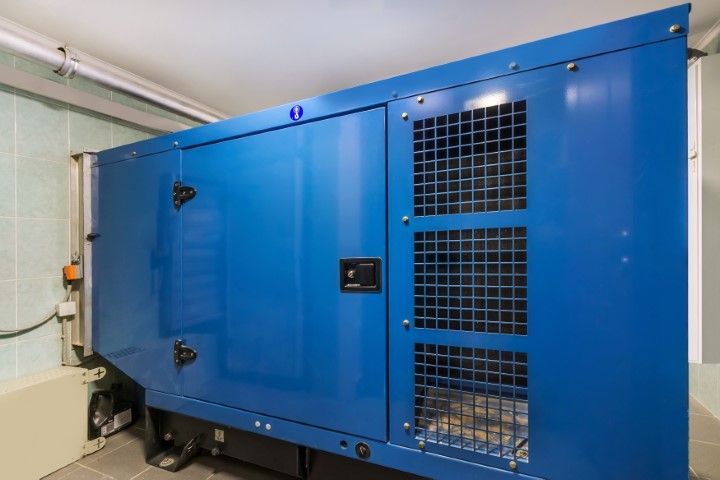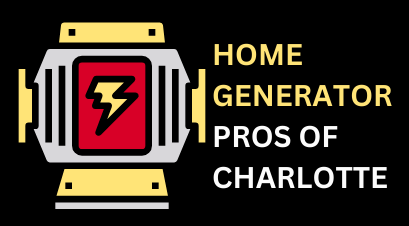Commercial Generators in Charlotte NC
A commercial generator is a robust power solution designed for businesses and large facilities. Unlike residential generators, these units are built to handle higher power loads, ensuring that critical operations remain uninterrupted during power outages. They are essential for maintaining business continuity, especially in industries where downtime can lead to significant losses.
Types of Commercial Generators
Commercial generators come in several types, each suited to different needs:
- Diesel Generators: Known for their reliability and long run times, diesel generators are often used in larger operations. They offer high power output and are ideal for facilities with significant energy requirements.
- Natural Gas Generators: These are cleaner and more environmentally friendly compared to diesel models. They are a good choice for businesses looking to reduce their carbon footprint and enjoy a more stable fuel supply.
- Propane Generators: Propane generators provide a balance between performance and environmental considerations. They are often used in areas where natural gas is not readily available.
- Hybrid Generators: Combining diesel and renewable energy sources, hybrid generators offer flexibility and efficiency. They are increasingly popular in businesses aiming to enhance sustainability.
Key Features to Consider
When selecting a commercial generator, consider the following features:
- Power Output: Ensure the generator can handle the electrical load of your business operations. It's essential to choose a unit with sufficient capacity to cover all critical systems.
- Fuel Efficiency: Look for generators that offer high fuel efficiency to minimize operational costs. Fuel efficiency can vary significantly between different types and models.
- Noise Levels: Commercial generators can be noisy. If noise is a concern, select a model with noise-reducing features or enclosures.
- Automatic Transfer Switch (ATS): An ATS ensures a seamless switch to generator power during an outage, reducing downtime and potential disruptions.
- Durability and Build Quality: A robust and well-built generator will have a longer lifespan and require less frequent maintenance.
Installation and Setup
Proper installation is crucial for the optimal performance of a commercial generator. Here’s what you need to know:
- Site Assessment: Before installation, conduct a thorough site assessment to determine the best location for the generator. Consider factors like ventilation, accessibility, and proximity to fuel sources.
- Permits and Regulations: Ensure compliance with local regulations and obtain necessary permits. Regulations may vary based on the type and size of the generator.
- Professional Installation: Hire a qualified technician to install the generator. Professional installation ensures that the unit is set up correctly and safely, reducing the risk of issues during operation.

Maintenance and Troubleshooting
Regular maintenance is key to keeping your commercial generator in top condition. Follow these guidelines:
- Routine Inspections: Schedule regular inspections to check for any wear and tear. This includes checking the oil level, coolant, and battery condition.
- Filter Changes: Replace air and fuel filters as recommended by the manufacturer. Clean filters contribute to better performance and efficiency.
- Battery Maintenance: Regularly inspect and maintain the battery to ensure it holds a charge and functions correctly.
- Troubleshooting: Familiarize yourself with common issues and their solutions. For example, if the generator fails to start, check the fuel supply, battery condition, and circuit breakers.
Cost Considerations
The cost of a commercial generator involves more than just the initial purchase price. Consider the following factors:
- Installation Costs: Professional installation can add to the overall expense. Get quotes from different service providers to find a reasonable price.
- Operating Costs: Factor in the cost of fuel and regular maintenance. Diesel generators might have higher fuel costs compared to natural gas or propane units.
- Insurance: Insurance coverage for the generator can help protect your investment from unforeseen damage or theft.
- Replacement Parts: Consider the availability and cost of replacement parts. Some models may have higher maintenance costs due to expensive parts.
Return on Investment
Investing in a commercial generator can provide significant returns, including:
- Business Continuity: Ensures that your business operations continue smoothly during power outages, preventing financial losses.
- Reduced Downtime: Minimizes interruptions and helps maintain productivity, which can translate into increased revenue.
- Enhanced Safety: Protects sensitive equipment and data, reducing the risk of damage and loss.
- Increased Property Value: Having a commercial generator can be an attractive feature for potential buyers or tenants.
If you’re considering investing in a commercial generator in Charlotte, NC, we’re here to help. Our team of experts can guide you through the selection, installation, and maintenance processes to ensure you get the best solution for your needs.
Contact us today to discuss your requirements and receive a personalized quote. Ensure your business is prepared for any power interruptions with a reliable commercial generator.
Common Issues and Solutions of Commercial Generators
Commercial generators are vital for businesses that need a reliable power source. They ensure operations continue smoothly even during power outages or disruptions. However, like any complex machinery, these generators can face issues that may impact their performance. Understanding common problems and their solutions can help maintain the efficiency and longevity of your generator, ensuring your business stays operational.
Engine Won’t Start
One of the most common issues with commercial generators is when the engine refuses to start. This problem can stem from several causes:
- Fuel Issues: Ensure the generator has enough fuel. Check for any clogs in the fuel line or filter that could be restricting fuel flow.
- Battery Problems: A dead or weak battery can prevent the engine from starting. Regularly check the battery’s charge and replace it if necessary.
- Starter Motor Issues: The starter motor could be faulty. Test it to see if it’s working correctly and replace it if needed.
Overheating
Generators can overheat, especially in high-demand situations. Overheating can cause serious damage if not addressed:
- Coolant Levels: Check the coolant levels and ensure there are no leaks. Low coolant levels can lead to overheating.
- Airflow: Ensure that the air vents and cooling fans are not obstructed by dust or debris. Clean them regularly to maintain proper airflow.
- Radiator Issues: Inspect the radiator for any signs of damage or blockage. A clogged radiator can impede cooling efficiency.
Low Oil Pressure
Low oil pressure can indicate a serious problem and can cause severe engine damage if not addressed:
- Oil Levels: Regularly check the oil levels and top up if necessary. Ensure the oil is of the correct type and viscosity.
- Oil Filter: Replace the oil filter as per the manufacturer’s recommendations. A clogged filter can affect oil pressure.
- Oil Pump: If the oil levels and filter are fine, the issue might be with the oil pump. Have it inspected and replaced if needed.
Electrical Issues
Generators are also prone to electrical issues, which can affect their performance:
- Wiring Problems: Inspect the wiring for any signs of damage or wear. Repair or replace any damaged wires to prevent electrical faults.
- Circuit Breakers: Check if any circuit breakers have tripped. Reset them and monitor if the issue recurs.
- Voltage Fluctuations: Voltage irregularities can signal issues with the generator’s alternator or voltage regulator. Have these components tested and repaired if necessary.
Unusual Noises
Generators should operate with minimal noise. Unusual sounds can indicate underlying problems:
- Engine Noise: Persistent knocking or grinding noises could be due to worn engine parts. Regular maintenance can help identify and fix these issues.
- Exhaust Noise: Excessive noise from the exhaust might indicate a problem with the muffler or exhaust system. Inspect and repair any damage.
Maintaining a commercial generator is crucial for ensuring your business remains operational during power disruptions. Regular maintenance and prompt attention to issues can help avoid costly repairs and downtime. If you're experiencing any of the problems mentioned or need assistance with your generator, contact us today. Our experienced technicians are here to provide reliable solutions and keep your generator running smoothly.
Applications of Commercial Generators
Healthcare Facilities
In healthcare settings, a continuous power supply is essential for patient safety and operational efficiency. Commercial generators are used in hospitals, clinics, and nursing homes to ensure that critical medical equipment, such as life-support machines, imaging devices, and refrigeration units for medicines, remain operational during power outages. These generators offer peace of mind, knowing that patient care will not be compromised.
Retail and Restaurants
For retail stores and restaurants, power interruptions can lead to significant losses due to spoiled inventory, disrupted service, and damaged electronic systems. Commercial generators provide an uninterrupted power source, allowing businesses to continue operating normally. In restaurants, this means maintaining kitchen operations and keeping refrigeration systems running, while retail stores can avoid the hassle of closing temporarily and losing sales.
Industrial and Manufacturing Facilities
Manufacturing plants and industrial facilities rely heavily on machinery and equipment that require a constant power supply to function effectively. Commercial generators ensure that these critical operations are not halted by power failures, which could lead to costly production delays and potential damage to equipment. By investing in a reliable generator, businesses can safeguard their operations against unexpected power disruptions.
Data Centers and IT Infrastructure
Data centers and IT infrastructure are highly sensitive to power fluctuations. A sudden power outage can result in data loss, system crashes, and operational downtime. Commercial generators are essential for maintaining the continuity of IT services, and providing backup power to servers, network equipment, and other critical components. This ensures that businesses can continue their operations without interruptions, protecting their data and technology investments.
Events and Outdoor Venues
For events and outdoor venues, a dependable power supply is crucial for lighting, sound systems, and other equipment. Commercial generators offer a reliable power source for concerts, festivals, sporting events, and outdoor gatherings, ensuring that the event runs smoothly regardless of the availability of grid power. They provide flexibility and reliability, contributing to the success of various events.
Educational Institutions
Schools and universities need to ensure that their facilities remain operational even during power outages. Commercial generators support critical systems such as lighting, heating, and cooling, allowing educational institutions to continue their activities without interruption. This is especially important for maintaining a conducive learning environment and ensuring the safety of students and staff.
In today’s fast-paced business world, a reliable power supply is crucial for maintaining smooth operations. Commercial generators play a key role in ensuring that businesses continue to function seamlessly, even when there are interruptions in the main power supply. These generators are designed to handle the demands of various industries, providing a dependable backup when needed. Whether you are running a large facility or a small business, understanding the diverse applications of commercial generators can help you choose the right solution for your needs.

If you’re considering investing in a commercial generator for your business or facility, it’s important to choose the right model and ensure proper installation and maintenance. Our team of experts is here to help you assess your power needs and recommend the most suitable solutions. Contact us today to discuss your requirements and learn how a commercial generator can benefit your operations. We are committed to providing reliable and efficient power solutions to keep your business running smoothly.
Feel free to reach out to us for more information or to schedule a consultation. We look forward to assisting you in finding the perfect commercial generator for your needs.
